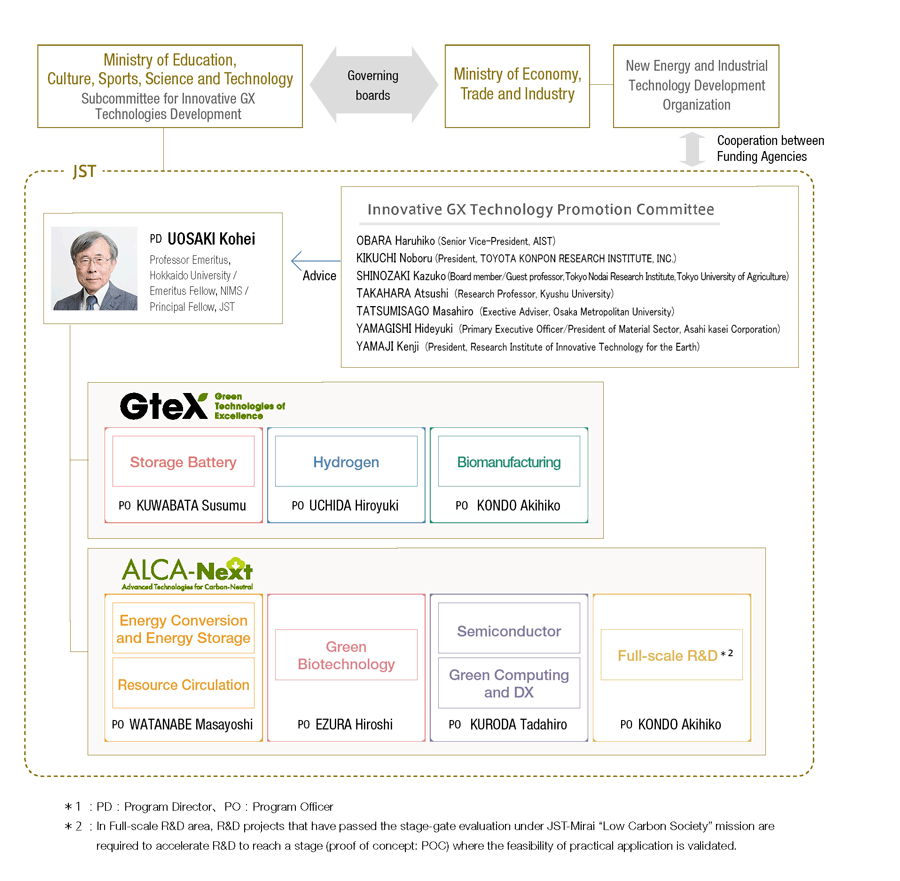News
- Symposium on Cross-Disciplinary Collaboration for GX Realization 2025
-
May 12, 2025
We launched the English site for 'Integrated Research and Development for GX Realization'.
Message from GteX/ALCA-Next PD

PD Kohei Uosaki (Professor Emeritus, Hokkaido University / Emeritus Fellow, NIMS / Principal Fellow, CRDS, JST)
The World Meteorological Organization (WMO) states in its State of the Global Climate 2023 (issued March 19, 2024) and its update for COP29 (issued November 11, 2024) that while 2023 was the hottest year on record, the average surface temperature from January to September 2024 was 1.54 ± 0.13°C, exceeding the long-term target of 1.5°C under the Paris Agreement, albeit for a limited period; ocean heat capacity and mean sea level are at record highs, and glaciers are shrinking significantly; and the concentration of the three major greenhouse gases (carbon dioxide, methane, and nitrous oxide) reached record highs in 2023. The report shows that the momentum of global warming has not stopped, and the resulting extreme weather events are having a major socio-economic impact around the world.
International efforts to address global warming are being discussed at the Conference of the Parties (COP) to the United Nations Framework Convention on Climate Change (UNFCCC), and in October 2020, the Japanese government declared its goal to become carbon neutral by 2050. On February 18, 2025, the Cabinet approved the Global Warming Prevention Plan and submitted a new "Japan's NDC (Nationally Determined Contribution)" to the UNFCCC, which aims to reduce greenhouse gas emissions by 60% and 73% in FY2035 and FY2040, respectively, from FY2013 levels. In order to achieve these lofty goals and create the industries of the future, it is essential not only to introduce existing technologies, but also to create new ones. In addition, the continuous creation of such technologies requires support for R&D and human resource development in academia in parallel with technology development and demonstration in industry.
In FY2023, JST launched the “Green Technologies of Excellence (GteX) Program,” which promotes research and development in the three areas of storage batteries, hydrogen, and biomanufacturing with an awareness of the final system that will lead to social implementation, under a team-based research system in which top-level researchers work together. In addition, as a complementary project, we are promoting the “Strategic Basic Research Program: ALCA-Next (Advanced Technologies for Carbon-Neutral),” which targets a wider range of fields and aims to create game-changing technologies with a small number of researchers. By operating both projects in an integrated manner and promoting collaboration between them, we aim to promote the entry and collaboration of researchers from different fields, achieve results in R&D related to carbon neutrality, foster young researchers, promote international collaboration, and make Japan the core of a global network for GX advancement.
Management system

Member of JST Innovative GX Technology Promotion Committee
- Haruhiko Obara
- (Senior Vice-President, National Institute of Advanced Industrial Science and Technology)
- Noboru Kikuchi
- (President, TOYOTA KONPON RESEARCH INSTITUTE, INC.)
- Kazuko Shinozaki
- (Board member, Tokyo University of Agriculture; Consultant/Guest professor, Tokyo Nodai Research Institute)
- Atsushi Takahara
- (Research Professor, Research Center for Negative Emission Technology, Kyushu University)
- Masahiro Tatsumisago
- (Exective Adviser, Osaka Metropolitan University)
- Hideyuki Yamagishi
- (Primary Executive Officer/President of Material Sector, Asahi kasei Corporation)
- Kenji Yamaji
- (President, Research Institute of Innovative Technology for the Earth (RITE))
About our programs
As countries around the world accelerate their efforts to achieve carbon neutrality, investments related to Green Transformation (GX) are expanding rapidly. To achieve this, it is important for business and academia to truly collaborate to create new science.
JST has been promoting programs related to carbon neutrality for about 15 years since 2010, starting with ALCA program in FY2010, which promotes research and development that contributes to significant reductions in CO2 emissions while adopting and evaluating R&D projects through a small-start and stage-gate approach. Since FY2017, we have been promoting low-carbon-related R&D under the JST-Mirai Program, which is a developmental expansion of the ALCA, using the same approach. In addition, we conducted team-based research from the perspective of realizing innovative batteries in the next-generation storage battery R&D project (ALCA-SPRING) since FY2013.

Applications
Advanced Technologies for Carbon-Neutral ALCA-Next
Call for FY 2025 R&D Proposals
https://www.jst.go.jp/alca/en/koubo/2025/index.html





